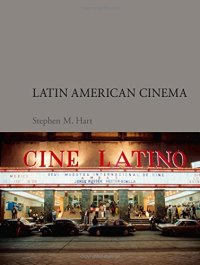
Ebook: Latin American cinema
Author: Stephen Hart & Stephen M. Hart
- Tags: Motion pictures -- Latin America. Motion pictures -- Latin America -- History. Motion pictures. Latin America.
- Year: 2015
- Publisher: Reaktion Books
- City: Latin America
- Language: English
- pdf
From El Megano and Black God, White Devil to City of God and Babel, Latin American films have a rich history. In this concise but comprehensive account, Stephen M. Hart traces Latin American cinema from its origins in 1896 to the present day, along the way providing original views of major films and mini-biographies of major film directors.
Describing the broad contours of Latin American film and its connections to major historical developments, Hart guides readers through the story of how Hollywood dominance succumbed to the emergence of the Nuevo Cine Latinoamericano and how this movement has led to the New” New Latin American Cinema of the twenty-first century. He offers a fresh analysis of the effects of major changes in film technology, revealing how paradigm shifts such as the move to digital preceded new cinematographic techniques and visions. He also looks closely at the films themselves, examining how filmmakers express their messages. Finally, he considers the decision by a group of directors to film in English, which enhanced the visibility of Latin American cinema around the world. Featuring 120 illustrations, this clear, cogent guide to the history of this region’s cinema will appeal to fans of Central Station and Like Water for Chocolate alike.
Describing the broad contours of Latin American film and its connections to major historical developments, Hart guides readers through the story of how Hollywood dominance succumbed to the emergence of the Nuevo Cine Latinoamericano and how this movement has led to the New” New Latin American Cinema of the twenty-first century. He offers a fresh analysis of the effects of major changes in film technology, revealing how paradigm shifts such as the move to digital preceded new cinematographic techniques and visions. He also looks closely at the films themselves, examining how filmmakers express their messages. Finally, he considers the decision by a group of directors to film in English, which enhanced the visibility of Latin American cinema around the world. Featuring 120 illustrations, this clear, cogent guide to the history of this region’s cinema will appeal to fans of Central Station and Like Water for Chocolate alike.
Download the book Latin American cinema for free or read online
Continue reading on any device:

Last viewed books
Related books
{related-news}
Comments (0)